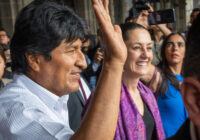This week The New York Times took on the nagging, unsolvable issue of persistent poverty in the richest nation in the world. Matthew Desmond, author of the book, Poverty, by America, has penned a long article making the point that, despite occasional; well-publicized efforts to solve endemic poverty or even understand its nature, the problem remains a political enigma. Desmond, however, has a few ideas that he feels could point to a solution.
Not only has the question of poverty resisted the various remedies that have been proposed –notably President Franklin Roosevelt’s “New Deal” in the 1930s and Lyndon Johnson’s “War on Poverty” in the 1960s – to a large extent, politicians prefer assessing blame rather than seeking answers.
One possible culprit proposed by commentators on the left is the ideology of neoliberalism. Desmond dismisses this explanation as false. “’Neoliberalism’ is now part of the left’s lexicon,” he tells us, “but I looked in vain to find it in the plain print of federal budgets, at least as far as aid to the poor was concerned. There is no evidence that the United States has become stingier over time. The opposite is true.” Some on the left may respond that the deeper issue isn’t about being either stingy or generous, but rather about the nature of neoliberalism itself. But Desmond doesn’t bother debating that question.
Desmond helpfully notes that, on the other side of the coin, some people on the right scoff at the idea that poverty is even a thing in the capitalist cornucopia known as the USA. He cites “observers like Ron Haskins and Isabel Sawhill, senior fellows at the Brookings Institution,” who “assert that ‘access to certain consumer goods,’ like TVs, microwave ovens and cellphones, shows that “the poor are not quite so poor after all.’” For them, poverty is in the eye of the beholder.
Today’s Weekly Devil’s Dictionary definition:
Access:
In the capitalist economy, the ability of a person to purchase anything someone else is willing to put a price on and make publicly available with the hope of making a profit.
Contextual note
Desmond obviously doesn’t agree that poverty is nothing more than an illusion in the richest of all possible worlds. He makes a solid point. “In fact,” he notes, “as things like cellphones have become cheaper, the cost of the most necessary of life’s necessities, like health care and rent, has increased.” He cites Michael Harrington’s classic text, The Other America: “It is much easier in the United States to be decently dressed than it is to be decently housed, fed or doctored.” The inability to meet one’s existential needs is perfectly compatible with owning all the standard gadgets that some people take to be the emblems of material success.
Though Desmond lets neoliberal philosophy off the hook, he focuses on a concept that was fundamental to Karl Marx’s criticism of “liberal” capitalism, the form of capitalism that existed before the modern neo-liberal era. Marx called it “exploitation.” Desmond sees exploitation in a lot of different places, but focuses on three principal ones. “The primary reason for our stalled progress on poverty reduction,” he posits, “has to do with the fact that we have not confronted the unrelenting exploitation of the poor in the labor, housing and financial markets.”
He sees a relationship between the liberty to make choices and exploitation. Citizens may be “free” in the sense of being unconstrained by law, but that doesn’t mean they are unconstrained by economic and social circumstance. “Our vulnerability to exploitation grows as our liberty shrinks,” he explains. And liberty itself, at least in the consumer society, is defined by the amount of available cash one has at any given time. The less there is, the more restricted one’s liberty, increasing the opportunity for exploitation by those with the means to exploit the less fortunate.
After reviewing the mechanisms that create systemic exploitation in the labor, housing and banking sectors, Desmond sums up the situation in these terms: “Poverty isn’t simply the condition of not having enough money. It’s the condition of not having enough choice and being taken advantage of because of that.”
Desmond offers recommendations concerning all of the forms of exploitation he describes. For example, concerning the financial sector he proposes that “banks should stop robbing the poor and near-poor of billions of dollars each year, immediately ending exorbitant overdraft fees.” He makes the point that the wealthy are never “taxed” in this way by the banks. But the poor collectively spend billions on such fees and penalties.
Desmond would like to see that predatory practice end. But how likely is that? Will politicians wake up after reading his book and immediately draft legislation at the national or state level to rectify the problem? Other political analysts have a clearer idea than Desmond why they almost certainly won’t. It’s a much simpler answer than Desmond’s answer to poverty. It can be stated in five words: “It’s not in their interest.” And they always have the choice to make their interest prevail.
Rather, we should ask ourselves a different question: Why is it totally unlikely if not unthinkable that the solutions he proposes, all of which are entirely rational and presumably doable? As he points out, most of them have been put in practice in former times and in specific places. This time the answer is pretty much the same: because the system of exploitation works for the benefit of those who have the means to keep it working for their benefit.
Desmond is clearly an optimist. “Unwinding ourselves from our neighbors’ deprivation and refusing to live as enemies of the poor,” he realistically recounts in his conclusion, “will require us to pay a price. It’s the price of our restored humanity and renewed country.”
The existing neoliberal system actually has already provided the answer as to who will receive the bill. All one has to do to “restore” and “renew” in the current system is find a clever way for poor people to pay for it.
Historical note
Desmond very helpfully reminds his readers that human history until recently promoted value systems that made a point of militating against exploitation. Those value systems are now widely considered out of date and inapplicable. It’s true that they weren’t always very successful in preventing whatever forms of exploitation existed in their day, but they did carry at least some serious intellectual prestige and sought to provide a frame of reference capable of discouraging exploitation.
Desmond details a short litany of examples from history. ”You can read injunctions against usury in the Vedic texts of ancient India, in the sutras of Buddhism and in the Torah. Aristotle and Aquinas both rebuked it. Dante sent moneylenders to the seventh circle of hell. None of these efforts did much to stem the practice, but they do reveal that the unprincipled act of trapping the poor in a cycle of debt has existed at least as long as the written word.”
Today the rule people have been taught to live by is Milton Friedman’s mantra: “there’s no such thing as a free lunch.” It’s corollary is that if you aren’t eating, you must be lazy to find a way of getting rich. But the way the neoliberal set of rules plays out is much simpler than that. Commenting on the dramatic and potentially earth-shaking collapse of Silicon Valley Bank earlier this week, economist Richard Wolfe, interviewed by George Galloway, explained the collapse as the consequence of “the repetition of a fundamental flaw in our system. You cannot have the social welfare protected if the people doing that have a private profit objective which is a higher priority for them.”
In any task-oriented culture – and that is what the modern world US-style has become – you define obejectives (or a superior defines them for you) and it is incumbent upon you to fulfil them. No time wasted for anyone who focuses on the objective and nothing else, but in the process a lot of human worth may be flushed down the toilet.
*[In the age of Oscar Wilde and Mark Twain, another American wit, the journalist Ambrose Bierce produced a series of satirical definitions of commonly used terms, throwing light on their hidden meanings in real discourse. Bierce eventually collected and published them as a book, The Devil’s Dictionary, in 1911. We have shamelessly appropriated his title in the interest of continuing his wholesome pedagogical effort to enlighten generations of readers of the news. Read more of Fair Observer Devil’s Dictionary.]
The views expressed in this article are the author’s own and do not necessarily reflect Fair Observer’s editorial policy.
Support Fair Observer
We rely on your support for our independence, diversity and quality.
For more than 10 years, Fair Observer has been free, fair and independent. No billionaire owns us, no advertisers control us. We are a reader-supported nonprofit. Unlike many other publications, we keep our content free for readers regardless of where they live or whether they can afford to pay. We have no paywalls and no ads.
In the post-truth era of fake news, echo chambers and filter bubbles, we publish a plurality of perspectives from around the world. Anyone can publish with us, but everyone goes through a rigorous editorial process. So, you get fact-checked, well-reasoned content instead of noise.
We publish 2,500+ voices from 90+ countries. We also conduct education and training programs
on subjects ranging from digital media and journalism to writing and critical thinking. This
doesn’t come cheap. Servers, editors, trainers and web developers cost
money.
Please consider supporting us on a regular basis as a recurring donor or a
sustaining member.
Will you support FO’s journalism?
We rely on your support for our independence, diversity and quality.









Comment